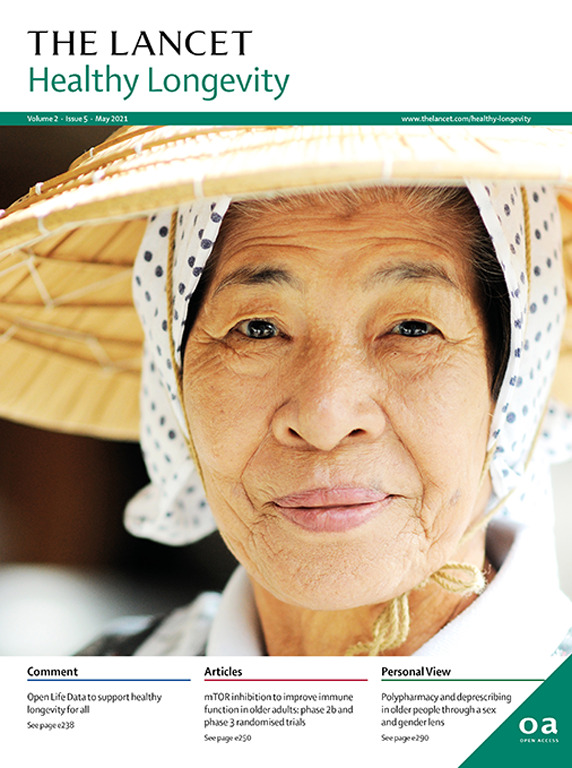Effectiveness of post-discharge exercise interventions in older adults following acute hospitalisation: a systematic review and meta-analysis
IF 14.6
Q1 GERIATRICS & GERONTOLOGY
引用次数: 0
Abstract
Background
Acute hospitalisation is a recognised risk factor for adverse outcomes in older adults, including hospital-associated disability. Post-discharge exercise interventions might mitigate physical and cognitive decline, although the few meta-analyses performed previously present limitations. This systematic review and meta-analysis aimed to evaluate the effect of post-discharge exercise interventions on health-related outcomes in older adults.
Methods
A systematic search of PubMed, Scopus, Web of Science, and ScienceDirect was conducted following PRISMA 2020 guidelines on May 16, 2025. Randomised controlled trials published from Jan 1, 2000, to May 16, 2025, were included. These studies assessed the effectiveness of muscular strength and endurance exercises in older adults (aged 60 years and older) discharged from acute hospitalisation. There were no language filters. Two reviewers independently screened studies using the PICOS framework, extracted data from published reports, and assessed methodological quality using the Physiotherapy Evidence Database scale. Data were pooled using a random-effects model. This systematic review and meta-analysis is registered with PROSPERO, CRD42025630147.
Findings
The search yielded 2868 results, of which 17 articles (1458 participants) met inclusion criteria, with a mean Physiotherapy Evidence Database score of 7·3 (SD 0·9) out of 10, indicating moderate to high quality. Post-discharge exercise significantly improved physical function (standardised mean difference [SMD] 0·78 [95% CI 0·52 to 1·05], p<0·0001). No significant effects were observed for health-related quality of life (SMD 0·23 [−0·04 to 0·51], p=0·098) or readmission risk (risk ratio 0·64 [95% CI 0·39 to 1·05], p=0·076). Exercise effects on functional independence, cognitive function, frailty, and mortality were synthesised descriptively due to insufficient data for meta-analysis. The main sources of heterogeneity were the outcome assessment tools and the exercise protocols. No evidence of risk of bias was found using either selection models (p>0·05) or Egger’s test (p>0·05) for any of the outcomes.
Interpretation
Post-discharge exercise interventions are effective at improving physical function in older adults following acute hospitalisation; however, effects on other health-related outcomes remain inconclusive. Future studies should establish optimal post-discharge exercise modalities, dosages, and delivery strategies tailored to individual patient needs. Advancing these priorities could improve patient outcomes and health-care system efficiency.
Funding
None.
老年人急性住院后出院后运动干预的有效性:系统回顾和荟萃分析
背景:急性住院是老年人不良结局的公认危险因素,包括医院相关残疾。出院后的运动干预可能会减轻身体和认知能力的下降,尽管之前进行的少数荟萃分析存在局限性。本系统综述和荟萃分析旨在评估出院后运动干预对老年人健康相关结局的影响。方法按照PRISMA 2020指南,于2025年5月16日对PubMed、Scopus、Web of Science和ScienceDirect进行系统检索。纳入了2000年1月1日至2025年5月16日发表的随机对照试验。这些研究评估了肌肉力量和耐力锻炼对急性住院出院的老年人(60岁及以上)的有效性。没有语言过滤器。两位审稿人使用PICOS框架独立筛选研究,从已发表的报告中提取数据,并使用物理治疗证据数据库量表评估方法学质量。数据采用随机效应模型汇总。该系统评价和荟萃分析已在PROSPERO注册,编号为CRD42025630147。结果:检索得到2868条结果,其中17篇文献(1458名受试者)符合纳入标准,物理治疗证据数据库的平均评分为7.3分(SD 0.9)(满分为10分),表明质量中等至高。出院后的锻炼显著改善了身体功能(标准化平均差[SMD] 0.78 [95% CI 0.52 ~ 1.05], p< 0.0001)。与健康相关的生活质量(SMD 0.23 [- 0.04 ~ 0.51], p= 0.098)或再入院风险(风险比0.64 [95% CI 0.39 ~ 1.05], p= 0.076)未见显著影响。由于meta分析数据不足,我们对运动对功能独立性、认知功能、虚弱和死亡率的影响进行了描述性综合。异质性的主要来源是结果评估工具和运动方案。使用选择模型(p> 0.05)或Egger检验(p> 0.05)对任何结果均未发现偏倚风险的证据。出院后运动干预对改善老年人急性住院后的身体功能是有效的;然而,对其他健康相关结果的影响仍不确定。未来的研究应该建立最佳的出院后运动方式、剂量和递送策略,以适应个别患者的需要。推进这些优先事项可以改善患者的治疗结果和卫生保健系统的效率。
本文章由计算机程序翻译,如有差异,请以英文原文为准。
求助全文
约1分钟内获得全文
求助全文
来源期刊

Lancet Healthy Longevity
GERIATRICS & GERONTOLOGY-
CiteScore
16.30
自引率
2.30%
发文量
192
审稿时长
12 weeks
期刊介绍:
The Lancet Healthy Longevity, a gold open-access journal, focuses on clinically-relevant longevity and healthy aging research. It covers early-stage clinical research on aging mechanisms, epidemiological studies, and societal research on changing populations. The journal includes clinical trials across disciplines, particularly in gerontology and age-specific clinical guidelines. In line with the Lancet family tradition, it advocates for the rights of all to healthy lives, emphasizing original research likely to impact clinical practice or thinking. Clinical and policy reviews also contribute to shaping the discourse in this rapidly growing discipline.
 求助内容:
求助内容: 应助结果提醒方式:
应助结果提醒方式:


